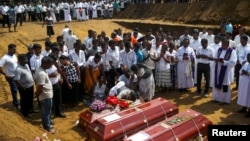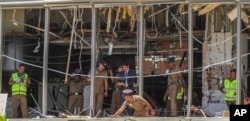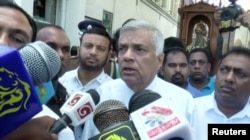The Islamic State terror group on Tuesday claimed responsibility for the deadly Easter terror attack in Sri Lanka, framing it as revenge against the “Crusader coalition” countries which defeated the terror group’s self-declared caliphate in Syria last month.
The bombings Sunday, targeting churches and hotels across Sri Lanka, killed more than 300 people and wounded at least 500 others.
Most of the dead and wounded were Sri Lankans, but officials said at least 38 foreigners were also killed, including British, Australian, Turkish, Danish, Dutch, Indian, Chinese and American citizens.
A formal communique from Islamic State said seven attackers had targeted “churches and hotels in which citizens of the Crusader coalition were present,” according to a translation by the SITE Intelligence Group.
Three of the terrorists “went towards a gathering of Crusaders in the Shangri-La, Cinnamon, and Kingsbury hotels in downtown Colombo, and detonated a number of devices, then detonated their explosive vests on the Crusaders,” the message said.
Separately, IS’ Amaq news agency issued a video showing the attackers pledging allegiance to IS leader Abu Bakr al-Baghdadi.
U.S. officials have yet to confirm IS’ claim, but said Monday it appeared likely that the terror group had at least inspired the Sri Lankan attackers.
If confirmed, the attacks would be the first major terror attacks perpetrated by IS since the collapse of its self-declared caliphate almost a month ago in the northeastern Syrian town of Baghuz.
Fight not over
At the time, U.S. and coalition officials were quick to point out that while IS had lost control over all the territory it had once held, the group remained potent, both as an active insurgency in Iraq and Syria, and as a terror network with affiliates across the globe.
“This is not the end of the fight against ISIS,” U.S. envoy for Syria James Jeffrey told reporters late last month, using an acronym for the terror group. “That will go on, but it will be a different kind of fight.”
Senior U.S. officials have repeatedly expressed concern about the strength and resiliency of IS affiliates in places like Afghanistan, Libya, the Sinai and the Philippines.
They have also warned of the potential impact of IS foreign fighters who have managed to return home as well as about IS’ ability to use social media to inspire and recruit.
“In a way they have been, unfortunately, the world’s pioneer in learning how to radicalize and mobilize people to violence in the virtual world,” Lt. Gen. Michael Nagata, the director of Strategic Operational Planning at the National Counterterrorism Center, warned last September.
While U.S. counterterrorism officials have not previously singled out Sri Lanka as a likely base of operations, the terror group does have links to the South Asian island nation.
In 2016, Sri Lankan officials said at least 32 nationals from “well-educated and elite families” had left to join IS in Syria.
On Tuesday, Sri Lankan Prime Minister Ranil Wickremesinghe told reporters some of those IS fighters had indeed come home.
“Some of them have returned and some have been killed there, and intelligence has been following them,” Wickremesinghe said. “There may be more than that, and that's what we want to find [out].”
Sri Lankan officials had initially blamed the bombings on two local terror groups, National Thowheeth Jamaath and Jammiyathul Millathu Ibrahim, adding the attack appeared to be carried out in revenge for the terror attack on two mosques in Christchurch, New Zealand last month which left 50 people dead.
But Wickremesinghe said Sri Lankan officials had been considering some connection to IS, and western intelligence officials have long noted IS has a track record of being able to coopt local terror groups to its cause.
"There was suspicion of links with IS,” he said.
IS had threatened revenge for the Christchurch terror attacks via social media, and that attack was cited as a reason for the attack in one of the initial IS claims Tuesday, disseminated via the terror group’s Amaq news agency.






